 FILM
FILM « In Which We Remain Miserable Throughout France »
 Monday, August 7, 2017 at 10:10AM
Monday, August 7, 2017 at 10:10AM 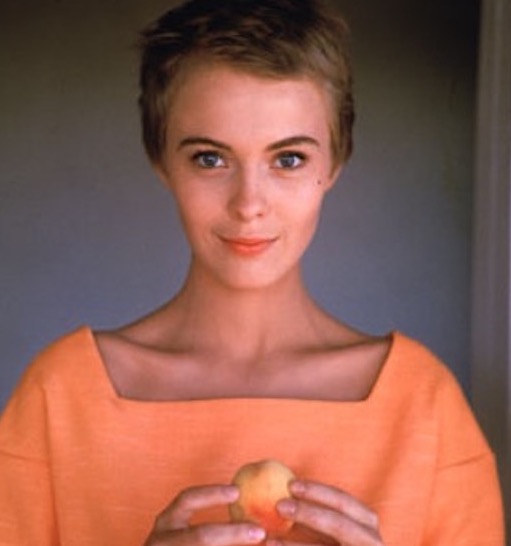
No Time For Sad Lament
by ALEX CARNEVALE
Bonjour Tristesse
dir. Otto Preminger
115 minutes
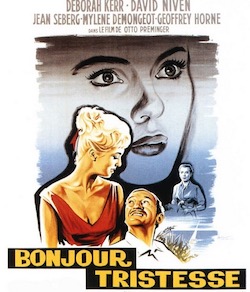 This summer, the Museum of Modern Art is presenting an exhibition of films featuring Deborah Kerr, a subtle and graceful actor born in Scotland. Far and away the best of this group is Otto Preminger's Bonjour Tristesse. This novella-type project feels today like an Americanized-Eric Rohmer moral fable, owing to a similarity in the source material. Anne (Deborah Kerr) is a successful fashion designer in Paris who is prepared to give everything up to marry Raymond (David Niven) against the wishes of his daughter Cecile (Jean Seberg) in a glorious house overlooking the French Riviera.
This summer, the Museum of Modern Art is presenting an exhibition of films featuring Deborah Kerr, a subtle and graceful actor born in Scotland. Far and away the best of this group is Otto Preminger's Bonjour Tristesse. This novella-type project feels today like an Americanized-Eric Rohmer moral fable, owing to a similarity in the source material. Anne (Deborah Kerr) is a successful fashion designer in Paris who is prepared to give everything up to marry Raymond (David Niven) against the wishes of his daughter Cecile (Jean Seberg) in a glorious house overlooking the French Riviera.
Preminger brings his own moral judgments to this milieu, and they are decidedly different from anything Rohmer had to offer. As a result, Bonjour Tristesse is a great deal less heartening than its peer films like Claire's Knee and The Collector, and probably one of the most depressing movies ever made. It begins with Cecile driving a young artist into the city. He asks her to marry him, but unfortunately she is largely dead inside, paralleling the real-life depression of Seberg, whose career in Hollywood slowed down considerably after she gave $10,000 to the Black Panthers.

Most well-known for her role in Godard's Breathless, Seberg is always initially charming to look at and listen to, like a perfectly preserved slice of cake. Gradually and sinisterly, we begin to loathe her in any role. As soon as Kerr comes on the scene and suggests she take care to study for her philosophy exam, she is dead set on eradicating this unpleasant new stepmother from her life. In order to do so, Cecile enlists the help of the local Jews – namely her father's ex-girfriend Elsa (Mylene Demongeot) and a law student named Philippe (Geoffrey Horne), with whom she never consummates a summertime affair.
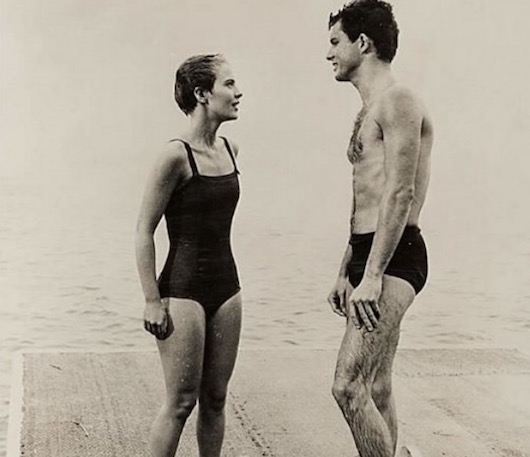
Cecile's colorful time during the summer is contrasted with the following winter, which she endures in harsh black and white. Paris resembles a baby perpetually trying to be born into a lusher, more omnipotent reality. Cecile's severe depression as various men fight over her and request her presence at such amusing events as the racetrack, dinner and dancing is mostly due to her father's inability to parent his daughter.
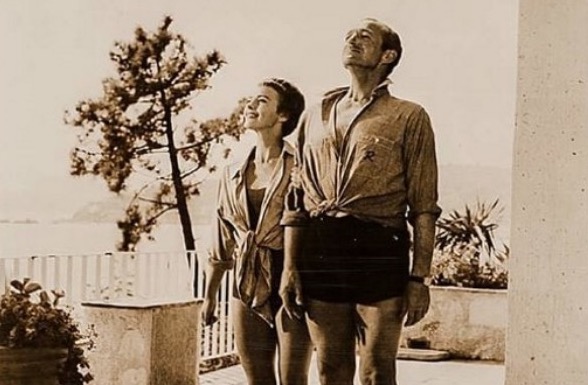
Indeed, the disturbing kisses that Raymond gives his daughter on the mouth are more inappropriate than invasive, but whatever the meaning of these pecks, it is clear that Raymond should not be drinking with her daughter, double dating with his daughter, or pincing the ass of a very violated local woman he has hired as the family maid. Seberg's acting adds to the idea the relationship is rather unconvincing.
Still, reactions to Jean Seberg's performance at the time Bonjour Tristesse debuted to mostly empty theaters were a bit out of proportion. Critics seemed to believe that somehow an American playing a coy French girl was on the level of a cosmic calamity. In the New York Herald Tribune, William Zinsser explained that Bonjour Tristesse is "as self-conscious as a game of charades played in an English country home. In the pivotal role, Jean Seberg is about as far from a French nymph as milk is from Pernod." The New Yorker suggested that Seberg required "a good solid, and possibly therapeutic, paddling."

When Deborah Kerr's Ann arrives on the scene, Raymond makes a big show of moving into the guest house while Cecile and Elsa occupy the other rooms in the main house. Ann's closed-off room parodies her private self – the walls are lined with books, and one lonely window looks out on the sea as she constructs deft and appealing sketches of her dresses. Meanwhile, Elsa's bedroom is atop the entire structure and features an astonishing amount of windows and doors, reflecting the transparency of her flighty, ethnic personality.
Preminger was the master of making do with what he had. Bonjour Tristesse's script, by Arthur Laurents, was written over the course of a few days, and Laurents passed on being on the set during film. "He really just left me on my own," Laurents later said of Preminger, whose direction never impressed him, "with one basic instruction, that we are to be removed from the characters, who don't have passionate emotions. Otto thought that kind of distance was 'high style.'" Where the screenwriter parted ways with Preminger was in the casting of British actors to play French parts. "Then, in the midst of this chic atmosphere, there is Jean Seberg - Miss Iowa," Laurents complained. He told Otto that Jean would sink all three of them and Bonjour Tristesse.

On the set of Bonjour Tristesse, Preminger was his usual tyrannical self. He particularly went after his pet project Seberg, who had little training as an actress. The starlet's face was also somewhat sore from an operation to remove moles from her cheeks and neck before she left for Europe to begin shooting. While Preminger undoubtedly had a very good reason to get her upset, since she is meant to be angry in most of Bonjour Tristesse, it made for an uncomfortable atmosphere.
As Forster Hirsch recalled in his biography of the director, Deborah Kerr stood up for her younger colleague against Otto's abuse.
I said, "Please, Otto, do you have to shout at the poor little girl like that? She seems to be taking all right but I'm not. I cannot work with this kind of atmosphere. I'm terribly sorry, but I just can't." The battering she received finished me, but it didn't her. I used to be a bit frightened for Otto. I thought he was going to have a heart attack, with his eyes popping and his face purple. But the next minute, it was gone. Completely gone. And this man who could be such a bully on the set, and who could destroy people, would then be a charming, witty companion at dinner who knew the best wines and caviar.
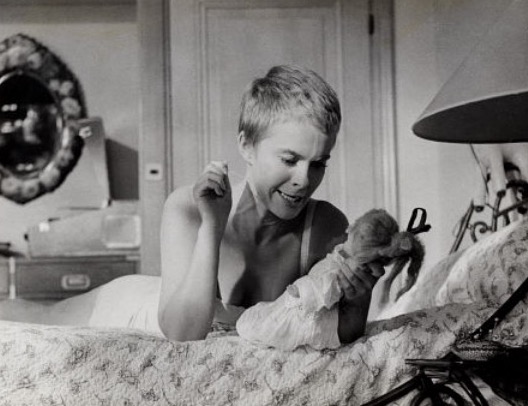
Part of Preminger's antagonism towards Seberg was borne out of their previous collaboration, Saint Joan, a Joan of Arc biopic that had been Preminger's most devastating box-office bomb up to that point. Seberg has her struggles in Bonjour Tristesse, but her mannered style of acting is not all that out of place today. The sets and tailored environments ultimately overwhelm and distract us from Jean's inadequacies. Just to see the French Riviera in this special time and place transports us in and among the atmosphere so seamlessly that Bonjour Tristesse ages like the wines the man knew so well. Even a fake France of 1958 is substantially better than a 2017 anything.

The final scenes of Bonjour Tristesse, filmed in the somber black-and-white that Preminger slips into as a hokey conceit, accentuates Seberg's total despair. At the age of forty, Seberg disappeared from her Paris home, taking only a blanket with her. She was found in the backseat of her car, a white Renault, having taken a massive quantity of barbiturates. Jean was on her third husband by then.
Alex Carnevale is the editor of This Recording.
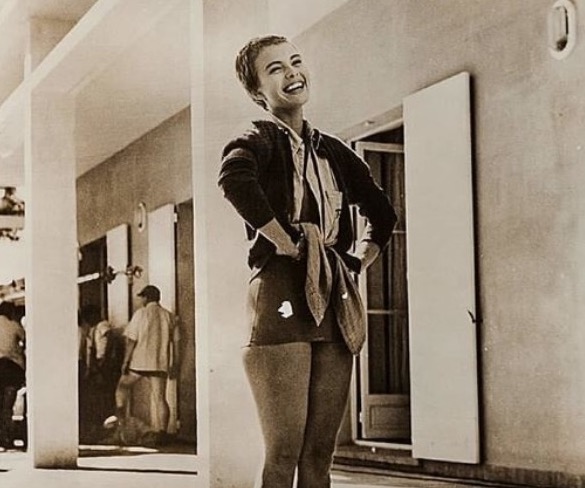






























Reader Comments